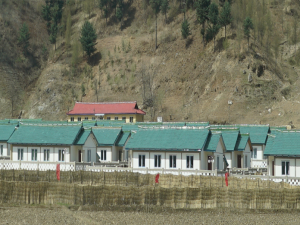With North Korea shaking up the Ministry of Electric Power Industry at the Eighth Party Congress for falling short of electricity production goals, Daily NK has learned that the authorities have recently issued a policy for electricity generation. They have reportedly crafted comprehensive measures to raise production at thermoelectric power stations and correct flaws in the payment system for electricity bills.
According to a high-ranking Daily NK source in North Korea last Tuesday, the authorities issued a broadly two-pronged electricity policy after the party congress that calls for 1) a major boost in electricity production and 2) improving the metering system.
First, the electricity policy appears focused on increasing the provision of coal to thermoelectric power stations. This is because the policy included an order to make maximum use of coal stored up due to the suspension of exports in power plants.
North Korea has apparently continued to illegally export coal even since 2017, when UN Security Council Resolution 2371 placed a complete ban on exports of North Korean coal. However, export totals have reportedly fallen compared to what they were prior to the sanctions.
Because of this, the authorities are calling for the use of “idle” coal in electricity production. However, even if they boost supplies of coal, actually increasing electricity production commensurate with that increase in supply will not be easy due to obsolete power generating equipment.
Acknowledging this problem, the authorities have also reportedly included in their electricity policy an order for the Cabinet to take responsibility for outdated equipment at the nation’s thermoelectric and hydroelectric power stations and immediately repair it.
Given that the party has issued an order to repair the equipment as quickly as possible, work on the repairs will likely begin. However, in the current situation with the border closed, the source told Daily NK it is uncertain whether North Korea can domestically produce or import the equipment it needs.
Moreover, it appears the authorities will strengthen the Cabinet’s monitoring of electricity production numbers. This is because the policy included a call for the Cabinet to start receiving quarterly reports on total electricity production – calculated based on total distribution by province.

Meanwhile, the authorities also took measures to end the practice of people shirking electricity bills by tampering with wattmeters.
From 2017, North Korea has mandated that families install wattmeters in their homes. However, with only two to six hours of electricity arriving a day, and irregularly at that, paying what the wattmeter says has had little meaning.
In the case of cadres or donjuLiterally "masters of money," donju refers to people who hav... More (North Korea’s wealthy entrepreneurial class) who use home appliances that require constant power such as refrigerators, they often pay bribes to illegally syphon power from nearby munition factories, military units or power distribution centers.
In order to eradicate these illegal practices, the authorities adopted a trial policy in Pyongyang early last year that called for lump-sum payments of electricity bills to the Cabinet’s National Electricity Supervisory Commission and enabled people to legally draw electricity from public institutions.
However, as official electricity rates paid to the Cabinet are too high, the authorities have been unable to expand the policy nationwide with even cadres shunning it.
Moreover, ordinary people with little money must pay electricity bills according to their wattmeters, but often avoid doing so by tampering with the numbers on their meters.
To resolve this, the authorities have adopted tamper-proof digital wattmeters, introducing them first to Pyongyang with plans to expand them nationwide within five years. However, as this measure also fundamentally depends on adopting devices, it will not be easy for the authorities to implement it as planned.
“In several fields such as production and people’s demand, [the authorities] have presented new measures to increase electricity production and minimize electricity waste, but ultimately, they’re methods that have been tried before,” said the source. “It seems it won’t be easy to resolve chronic electricity shortages with these measures alone.”

















